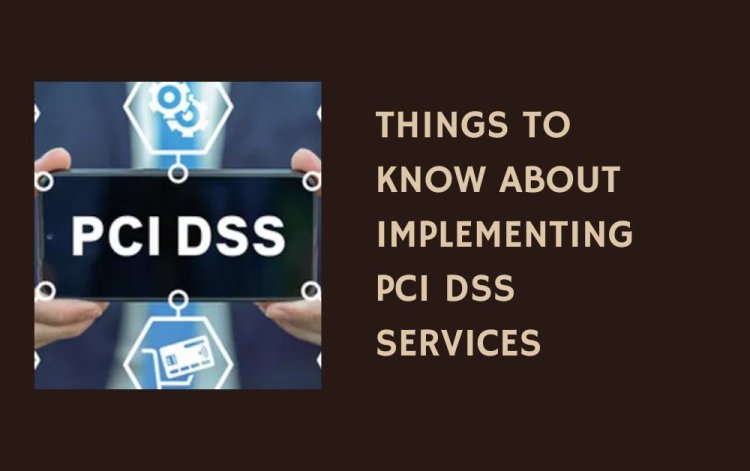Things to Know About Implementing PCI DSS Services
Share this Post to earn Money ( Upto ₹100 per 1000 Views )

In today's digital age, where financial transactions are frequently conducted online, ensuring the security of payment data is paramount. The Payment Card Industry Data Security Standard (PCI DSS) is a set of requirements intended to ensure that all companies that process, store, or transmit credit card information maintain a secure environment. Implementing PCI DSS can seem daunting, but it’s essential for protecting your business and your customers. This blog will walk you through the key things you need to know about implementing PCI DSS services effectively.
Understanding PCI DSS and Its Importance
What is PCI DSS?
PCI DSS stands for Payment Card Industry Data Security Standard, which was developed by the PCI Security Standards Council. This standard is designed to protect card information during and after a financial transaction. PCI DSS is crucial for all businesses that accept credit card payments, regardless of the size or transaction volume.
Why is PCI DSS Important?
Implementing PCI DSS helps protect your business from data breaches and theft of cardholder data. Not only does it help you avoid costly fines and penalties associated with non-compliance, but it also builds trust with your customers by ensuring their payment information is secure.
Key Requirements for PCI DSS Compliance
Building and Maintaining a Secure Network
- Install and maintain a firewall configuration to protect cardholder data.
- Do not use vendor-supplied defaults for system passwords and other security parameters.
Protecting Cardholder Data
- Protect stored cardholder data by encrypting transmission of cardholder data across open, public networks.
- Use encryption, truncation, masking, and hashing to safeguard sensitive data.
Maintaining a Vulnerability Management Program
- Use and regularly update anti-virus software.
- Develop and maintain secure systems and applications to protect against security vulnerabilities.
Implementing Strong Access Control Measures
- Restrict access to cardholder data by business need-to-know.
- Assign a unique ID to each person with computer access to cardholder data.
- Restrict physical access to cardholder data to protect against unauthorized access.
Steps to Implement PCI DSS Effectively

Assess Your Current Situation
Start by assessing where your business stands in relation to PCI DSS requirements. Identify the scope of your compliance by mapping out where and how cardholder data flows through your business. This step is crucial for uncovering any vulnerabilities in your current system.
Remediate and Optimize Security Measures
Address any vulnerabilities that were identified during the assessment phase. This might involve reconfiguring systems, updating software, and enhancing security protocols. Ensure that all system components, processes, and custom software are compliant with PCI DSS standards.
Implement Regular Monitoring and Testing
- Track and monitor all access to network resources and cardholder data to ensure that critical controls are effective.
- Regularly test security systems and processes. Vulnerability scans and penetration testing can help you identify and fix security weaknesses before they can be exploited.
Document Policies and Educate Your Team
Create a robust security policy that addresses information security for employees and contractors. Regularly educate and train your team on these policies and the importance of security practices. Making sure that everyone understands their role in maintaining PCI DSS compliance is key.
The Benefits of Being PCI DSS Compliant
Enhanced Security
By adhering to PCI DSS standards, your business will benefit from enhanced security measures that protect against data breaches and cyber threats.
Customer Trust
PCI DSS compliance reassures your customers that their sensitive payment card information is treated with the utmost security and respect, fostering trust and enhancing customer relationships.
Competitive Advantage
Compliance can differentiate your business from competitors who may not prioritize data security, potentially driving more business to your secure environment.
Conclusion:
Implementing PCI DSS is not just about compliance; it's about safeguarding your business and your customers in a world where digital transactions are the norm. By understanding and implementing the requirements of PCI DSS, you can protect your business from the potential devastation of data breaches and build a trustworthy relationship with your customers. Start the journey towards PCI DSS compliance today—it's a strategic investment in your business's security and reputation.
Note:- For more articles visit on blog.rackons.





![[[[[[+27-640-243-780]]]]]. Powerful spiritual traditional healer ciites in in SOMERSET/Arniston](https://blog.rackons.in/uploads/images/202409/image_380x226_66f71746bbd1d.jpg)


